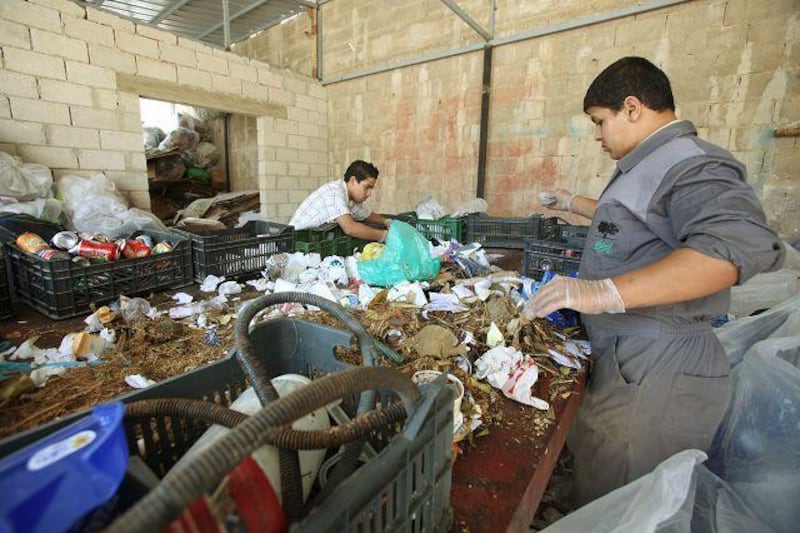AMMAN // Three young children tied up their donkey next to a rubbish bin in one of Amman's upscale neighbourhoods. The youngest rummaged inside the bin oblivious to the dirt and the sharp and hazardous objects that might get in his way. He emerged with a few soft-drink cans and some broken plastic and handed them to his sister and older brother. Twice a day, before Amman municipality workers come by collecting rubbish, a legion of scavengers from children to young men eke out a living by searching waste bins for metal scraps, cartons, empty perfume bottles and any other recyclable materials that could be sold.
Although it has become a familiar scene in many of the capital's neighbourhoods, authorities say the practice is creating an uncivilised image of the country. "Scavengers often leave the garbage scattered, exposing citizens to hygienic risks and environmental problems," said Zaydoun Nsour, executive director of environment at the Greater Amman Municipality, said. "It is becoming a growing phenomenon, therefore we are seeking to rehabilitate them."
Ahmed, 32, has been scavenging rubbish bins for the past two years, since his father died. As he rummaged through plastic bags and threw away their contents, he also munched on whatever leftover food he found inside. "I am looking for aluminium and Pepsi cans. I sell one kilo for 60 piasters (Dh3). I sometimes collect three kilos a day, but whatever money I make is quickly spent," he said. "I do not have a job. I quit school a long time ago, in eighth grade [at age 13]. My mother is sick, and my youngest sister is in school, so I am taking care of them."
In a country where 14.7 per cent of Jordanians are poor and unemployment officially stands at 12.7 per cent, scavenging has become a way of life for many. In an effort to tackle the problem, Amman teamed up with the federal environment ministry and Entity Green Training (EGT), a Jordanian company that provides services to meet the needs of poor and marginalised communities through sustainable development. The three hope to launch a recycling pilot project by the end of the year that aims to help scavengers better collect and sort waste in the downtown area of Amman, to reduce, reuse and recycle rubbish.
Scavenging is turning into a profitable business, Mr Nsour said. "It is the public health that we are concerned about. Therefore, we want them to scavenge in a civilised manner and we want to raise their awareness on how to deal with the waste." Wajih Ireifej, the EGT general manager, said: "We are in the late stages of getting an agreement in place." The company, established in March last year, is already running a full-scale recycling programme that combines training and employment for vulnerable youths with an environmental waste management system. Amman is seeking to use EGT's expertise in retraining scavengers.
"The project with the municipality [aims] to create a recycling centre in an old garbage transfer station that we would run and operate. We would make it available for scavengers to bring in whatever they collect and we would buy from them," Mr Ireifej said. "We would also go on municipality trucks to the garbage bins and take the recyclable stuff out before it goes into the garbage. Basically, we would be probably employing between 12 and 20 people who would do that - typically what the scavengers go after now is the high-value items, but they don't understand that there are a lot of valuable stuff out there. For example, there are seven kinds of plastic, and there is actually some plastic that is actually more worth than aluminium."
Last year, 56 scavengers graduated from four sessions of a three-month training course that taught them how to efficiently collect, store and package material as part of its recycling programme. Hamdi Khalil, 41, is one of the graduates who in the past three years scavenged rubbish in the Ein Al Basha area, next to the impoverished Palestinian refugee camp of Baqa'a, where he lives. "I used to search the garbage discreetly and quickly because I didn't want anyone to see me. I never left anything untouched, from plastic stuff to electrical appliances. And I used to scatter the garbage and never cared about the garbage collector," the father of three said.
"Once I was searching the garbage in a different neighbourhood and a rich cousin of mine saw me, and asked me what I was doing and then he turned his back; people looked down on me." After the course, his perspective about scavenging changed, and he now ensures that there is no mess left behind. He also wears gloves and uses a cart. "Now I know what to look for and I make sure I leave the garbage like it was."
Just last week, Mr Khalil got a new job, as a rubbish collector at the University of Jordan, but he said he would continue to scavenge on the weekends. @Email:smaayeh@thenational.ae






